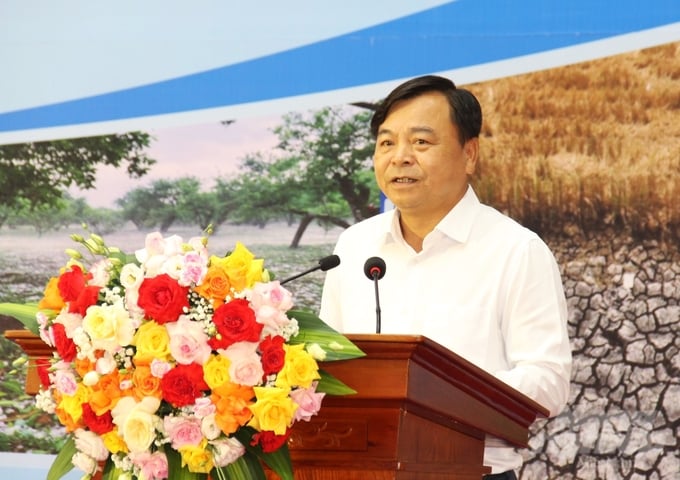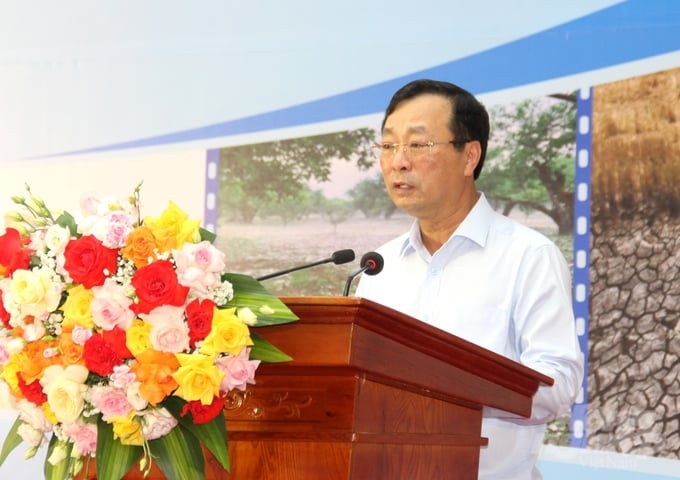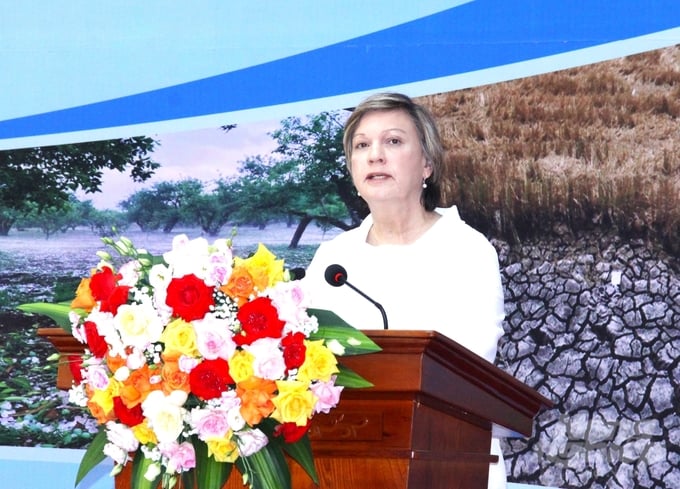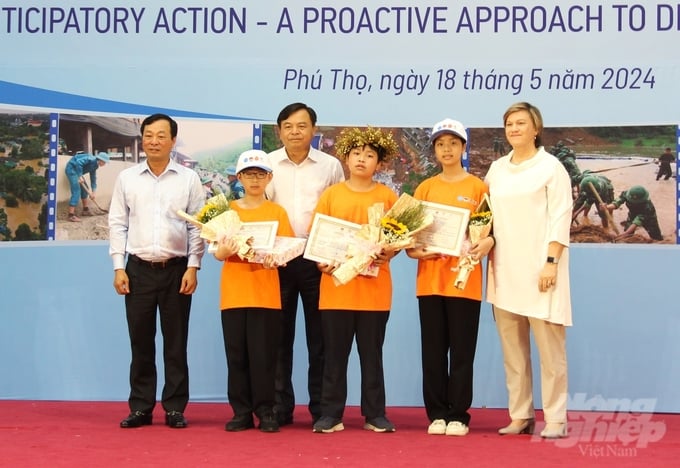May 21, 2025 | 03:55 GMT +7
May 21, 2025 | 03:55 GMT +7
Hotline: 0913.378.918
May 21, 2025 | 03:55 GMT +7
Hotline: 0913.378.918
The National Steering Committee for Natural Disaster Prevention and Control, in collaboration with Phu Tho Provincial People's Committee of and the United Nations International Children's Emergency Fund in Vietnam (UNICEF), organized a ceremony in observance of the 2024 National Week for Disaster Prevention and Control. The event was held in Phu Tho province on May 18.

Deputy Minister Nguyen Hoang Hiep, Deputy Head of the National Steering Committee for Natural Disaster Prevention and Control, projected that natural disasters in Vietnam will continue to experience unpredictable developments until the end of 2024. Photo: Trung Quan.
Mr. Nguyen Hoang Hiep, Deputy Minister of Agriculture and Rural Development and Deputy Head of the National Steering Committee for Natural Disaster Prevention and Control, highlighted: "On February 13, 2019, the Prime Minister issued Decision No. 173/QD-TTg designating the week from May 15 to May 22 as the annual "National Week for Disaster Prevention and Control" with the aim of raising awareness and responsibilities among government agencies and the local community in disaster prevention and control efforts. Consequently, this initiative aims to foster a society protected from natural disasters, and promote the country's sustainable development."
The 2024 National Week for Disaster Prevention and Control, themed "Anticipatory Action: A Proactive Approach to Disaster Management", aims to promote the Ha Long Ministerial Statement on the strengthening of ASEAN anticipatory actions in disaster management. The Statement is an initiative adopted by Vietnam as the host country at the 11th ASEAN Ministerial Meeting on Disaster Management, held in Quang Ninh province.
The ceremony held in Phu Tho province, featuring various meaningful activities, is both an annual event and a practical response to the National Week for Disaster Prevention and Control. The ceremony is part of a series of activities in observance of the National Week for Disaster Prevention and Control include: various ceremonies, the "A View Ahead of Disasters" painting competition , the Ring the Golden Bell contest "Together in Disaster Prevention and Control - Building a Sustainable Future", and outdoor "Readiness for Natural Disasters and Climate Change" mural painting activities.

According to Mr. Bui Van Quang, Chairman of Phu Tho Provincial People's Committee, the increasingly evident negative impacts of weather and climate change in recent years have resulted in extreme and erratic natural disaster patterns within the province. Photo: Trung Quan.
Deputy Minister Nguyen Hoang Hiep emphasized that "anticipatory action" is a new approach in disaster management, implemented by the United Nations and countries worldwide to further enhance disaster prevention and preparedness, with a focus on vulnerable groups. Activities include strengthening forecasting, warning systems for disasters; disseminating information regarding natural disasters to local communities; inspecting and maintaining the safety of disaster prevention and control structures; evacuating residents from hazardous areas to safety; among many others.
Over the last twenty years, natural disasters have caused an average of 300 deaths and disappearances annually, with economic losses ranging from 1 to 1.5% of GDP. Notably, 21 out of 22 types of disasters occurred nationwide in 2023, with nearly 2,000 natural disaster events recorded, resulting in 169 deaths and disappearances, and economic losses exceeding 9,300 billion Vietnamese dong.
The Northern region of Vietnam, particularly the Northern mountainous areas, experiences constant natural disasters throughout the year, including heavy rains, floods, flash floods, landslides, heatwaves, cold waves, etc. Among these natural disaster events, flash floods and landslides have been increasing in frequency, resulting in significant damage to the region. Notably, heavy rains accompanied by flash floods and landslides in early August 2023 in the Northern mountainous areas have resulted in 17 deaths and disappearances; caused extensive damage to over 2,000 houses; and destroyed several thousands of hectares of rice and flower crops.
The El Niño climate phenomenon has caused severe droughts and saltwater intrusion in the Mekong Delta region since the beginning of 2024. On the other hand, severe cold waves, thunderstorms, hailstorms, and lightning storms in the Northern mountainous areas have affected the daily lives and activities of local residents. Moreover, forecasts indicate that natural disasters will continue their unpredictable patterns until the end of 2024. Consequently, it is crucial to focus on anticipatory action to mitigate losses.

Ms. Rana Flowers, UNICEF Representative in Vietnam, believes that children will experience long-term effects from climate crises if we fail to take anticipatory action. Photo: Trung Quan.
According to Mr. Bui Van Quang, Chairman of Phu Tho Provincial People's Committee, the increasingly evident negative impacts of weather and climate change in recent years have resulted in constant, extreme, and erratic natural disaster patterns within the province throughout the year. These events have resulted in significant economic and social repercussions.
In 2023 and early 2024, Phu Tho province experienced 20 severe thunderstorms that caused 2 deaths and 3 injuries; damaged over 1,900 houses, offices, and schools; destroyed over 2,100 hectares of rice and flower crops; and killed over 2,000 livestock. Notably, the water levels in various local rivers reached their lowest historical points.The resulting steep flow gradient caused extensive and dangerous riverbank erosion, affecting over 9,000 meters of riverbanks, 2,000 meters of embankments, multiple dike culverts, and houses. The total damage value was estimated at 100 billion Vietnamese dong.
In response to these challenges, Phu Tho province has acknowledged disaster prevention and control as a foremost, regular, and continuous task for its government. During the 2024 National Week for Disaster Prevention and Control, the province reaffirmed its commitment to enhancing disaster prevention and control capacity in the spirit of "Anticipatory action: A Proactive Approach to Disaster Management", as initiated by the National Steering Committee for Natural Disaster Prevention and Control. The province is also actively focusing on sustainable socio-economic development, with an emphasis on adapting to natural disasters and climate change.

Delegates awarding prizes for the Ring the Golden Bell contest "Together in Disaster Prevention and Control - Building a Sustainable Future" to participating students. Photo: Trung Quan.
Consequently, the province must implement various comprehensive and systematic solutions, including: integrating disaster prevention and control activities into the province's socio-economic development plans and strategies; maintaining the safety of disaster prevention and control infrastructure; enhancing forecasting and warning capacities; maximizing the effectiveness of information dissemination programs; mobilizing and utilizing resources for disaster prevention and control activities in an efficient manner; enhancing community disaster prevention and control capacities; and prioritizing the protection of vulnerable groups, particularly children.
Ms. Rana Flowers, UNICEF Representative in Vietnam, commented: "Climate crises are no longer a distant future scenario, but a looming reality that significantly impact the national economy, livelihoods of families, the future of communities, and the development of children."
Forecasts from UNICEF indicate that no threat poses a greater risk to the national economy, human survival, public health, and the development of children than climate crises.

A series of activities in observance of the National Week for Disaster Prevention and Control include: various ceremonies, the "A View Ahead of Disasters" painting competition , the Ring the Golden Bell contest "Together in Disaster Prevention and Control - Building a Sustainable Future", and outdoor "Readiness for Natural Disasters and Climate Change" mural painting activities. Photo: Trung Quan.
Droughts and saltwater intrusion in Southern Vietnam, along with widespread heatwaves, landslides, and floods in the Central and Northern regions are growing in terms of severity. This rapid development demonstrates a tangible threat that can potentially exacerbate issues of malnutrition, disease outbreaks, education disruptions, and food and water security.
Among those affected, children are especially susceptible to the long-term effects of climate crises. Consequently, it is essential to prioritize disaster prevention and control planning; take anticipatory action to build climate resilience for every segment of society. With children at the heart of disaster prevention and control efforts, stakeholders must reinforce early warning systems targeting children and vulnerable groups. Moreover, children and adolescents should be encouraged to harness their creative capacity, energy, and innovative ideas, thereby fostering safer, and more sustainable communities.
Translated by Nguyen Hai Long

(VAN) Japan's grant aid project contributes to capacity building, promoting organic agricultural production, and fostering sustainable community development in Dong Thap province.

(VAN) For years, the CRISPR-Cas9 genome technology has been reshaping genetic engineering, a precision tool to transform everything from agriculture to medicine.

(VAN) Vietnam aims to become a 'leader' in the region in the capacity and managing effectively soil health and crop nutrition.
![Reducing emissions from rice fields: [Part 1] Farming clean rice together](https://t.ex-cdn.com/nongnghiepmoitruong.vn/608w/files/news/2025/05/05/z6509661417740_a647202949c539012a959e841c03e1d3-nongnghiep-143611.jpg)
(VAN) Growing clean rice helps reduce environmental pollution while increasing income, allowing farmers to feel secure in production and remain committed to their fields for the long term.
/2025/05/19/5136-1-144800_230.jpg)
(VAN) The Nghe An Provincial People's Committee has just approved the list of beneficiaries eligible for revenue from the Emission Reductions Payment Agreement (ERPA) in the North Central region for the year 2025.

(VAN) 14 out of 35 domesticated elephants in Dak Lak province have had their living conditions improved, with 11 of them currently participating in the non-riding elephant tourism model.

(VAN) Muong Nhe Nature Reserve hopes that being upgraded to a national park will lay the foundation for forest protection efforts to be carried out in a systematic, modern, and sustainable manner.